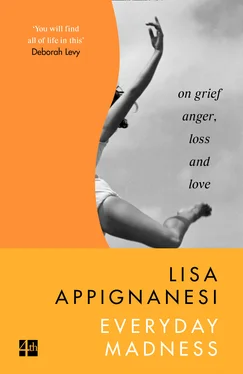But none of it helped quite enough. Only time would do that, and not yet, perhaps never completely. This wasn’t a bout of flu that could be got over and put behind one with minimal fuss.
Hard to admit, but my frenzy of searching, both physical and mental, had a distinct sexual charge. I no longer or only rarely saw John on his deathbed, or even as he had been through those long arduous years of treatment. He had grown younger. His hair had darkened and there was more of it. He had become the man I had first met more than three decades before.
It took a while, but I eventually realized that all my racing internal arguments with him – how could you? Why did you? Why aren’t you? Don’t you love me? Why did you bother coming back to our conjoined lives? Why? When? How? – all these howling questions, with their component of desire and jealousy, love and hate, were a vigorous attempt to bring him back. In the flesh.
If he were back, then I could scream and he could answer my questions. I could rant at his perfidy. I could unleash my resentment. I could kill him. And we could make up.
In Proust’s À la recherche du temps perdu , after Marcel’s lover Albertine has died, he writes:
My jealous curiosity as to what Albertine might have done was unbounded. I suborned any number of women from whom I learned nothing. If this curiosity was so tenacious, it was because people do not die for us immediately, but remain bathed in a sort of aura of life which bears no relation to true immortality but through which they continue to occupy our thoughts in the same way as when they were alive. It is as though they were traveling abroad.
I preferred John to be travelling abroad, to remain in the realms of desire.
To be desired, my old friend John Berger writes, is perhaps the closest anybody in this life can reach to feeling immortal.
I would have preferred to have John immortal and doubtless have a little of that immortality myself. Instead all I had was a half-empty shampoo bottle. Memory of Senses .
When I looked up the word ‘bereavement’ in the Oxford English Dictionary , it turned out to be etymologically linked to the old Germanic ‘reave’ – to plunder by force, to carry out raids in order to rob. I felt plundered. Be-Reft. My partner was gone. My lived past, which had been lived as a double act, had been ransacked, stolen. The story of my own life had to be rewritten. And I was guilty. Guilty of being a survivor. Literally. Before the late 1960s turned people like my parents – who had, against all the odds, made it through the war – into survivors, a survivor was simply someone who outlived another.
IN ONE OF HIS seminal insights, Freud linked the state of mourning to the condition of melancholia, which we would now call depression. The characteristics that mourning shared with depression include
a profoundly painful dejection, a cessation of interest in the outside world, loss of the capacity to love, inhibition of all activity, a lowering of the self-regarding feelings to a degree that finds utterance in self-reproaches and self-revilings, and culminates in a delusional expectation of punishment –
The singular difference is that in mourning ‘the lack of interest and turning away of activity’ common to depression has an exception when it comes to that connected with ‘thoughts of him’.
Both states are set in motion by loss.
In one of his understated asides, Freud notes, ‘It is really only because we know so well how to explain it that this attitude [in mourning] does not seem to us pathological.’ This is particularly the case if one considers that a clinging to the dead through the medium of a ‘hallucinatory wishful psychosis’ can be part of mourning, too.
In his ‘Thoughts on War and Death’ written in 1915, very soon after Mourning and Melancholia , he elaborated the inevitable ambivalence that unwittingly characterizes all our loves:
These loved ones are on the one hand an inner possession, components of our own ego; but on the other hand they are partly strangers, even enemies. With the exception of only a very few situations, there adheres to the tenderest and most intimate of our love-relations a small portion of hostility.
This small portion of hostility can quite easily grow large in the dead partner with whom we in part identify, just as children identify with their parents, take them in, often enough later on only to spit them out. It is these very parts in the other that then turn back on us rampantly, like an avenging conscience, to persecute us into abjection once they have been lost. Have gone.
The French psychoanalyst Jacques Lacan talked about such cruel and vindictive self-persecution as the work of an ‘obscene super-ego’, the super-ego being in Freudian terms that internalized, endlessly repetitive, sadistic and rancorous conscience – initially shaped out of our parents’ prohibitions and cultural settlements on good and bad – that yaps away at us like a small-town bully, belittling us, turning us into a nether likeness of Hamlet, one without poetry. In a wonderful riff on self-criticism, the analyst Adam Phillips evokes a Hamlet whose dangerous desire for vengeful murder is converted into a form of character assassination – his own: ‘the character assassination of everyday life, whereby we continually, if unconsciously, mutilate and deform our own character’.
The Hungarian-born Melanie Klein, so influential in understandings of psychoanalysis in Britain, thought of mourning as a reactivation of the inevitable early-childhood depression: the loss of the loved person, like the loss of internal ‘good objects’ in infancy, threatens a collapse. Mourning is thus a maddening process in which hatred, guilt and love oscillate until the ‘internal good objects’ can be reinstated and the dead person put to rest.
And all of this while we’re having a cup of coffee with a friend and talking about the weather. Stormy in these days of inner warming. Holding out hope, too, that those internal good objects come round.
Not that there’s a mother in sight anywhere.
THE WOMAN WHO is a simulacrum of me and not a dishevelled midnight gorgon, punished from all sides and punishing in turn, goes about her duties. She tries to be a good mother and grandmother; she deals with the bureaucracy of death and the lawyers who are its servants; she tries to concentrate on the minutiae of pensions and old share certificates more abstruse than incunabula. She writes bits – an artist’s catalogue preface, an essay for the BBC. She sits at a desk and finishes the book he hadn’t quite finished. She prepares the second for publication. She hunts for an archive for his work. She puts in train memorials and conferences. At these she manages more or less to utter a few lucid sequential sentences. Or at least she thinks she has for a moment, before going home to beat herself up.
The reality was that I could work on ‘thoughts connected to him’, as Freud called them, but not on much else for long spans consecutively. Not only had I been his first reader and editor for years, but the work allowed me to focus, more or less, on the public portions of him. The positive side effect was that I was able to concentrate on the parts of him I wasn’t so preoccupied with hating. This activity was, I imagine, an attempt to repair the destruction I had wrought on him and he on me.
Though I was still alive.
I wasn’t an altogether good enough mother, though. My daughter admonished me for being short-tempered with her and not sufficiently sensitive to her own grieving or, on one or two occasions, for erupting in negative asides about her beloved dad. I didn’t mean to. I wasn’t always aware that I had. But I evidently had. All this made me think about my own mother all those years ago after my father had died. I really did need to consider the generational cascade of repetitions or hauntings that are an all but inevitable part of family life.
Читать дальше












